Psychosocial Development in Early Childhood: A Comprehensive Analysis
VerifiedAdded on 2022/10/17
|8
|2019
|19
Essay
AI Summary
This essay provides a comprehensive overview of child psychosocial development, focusing on the preschool stage (2-5 years). It begins with an introduction to psychosocial development and its significance, followed by an exploration of Erik Erikson's theory, particularly the stages of autonomy vs. doubt and initiative vs. guilt. The essay then analyzes the application of these concepts through a case study, providing examples of normative development. Further, it examines the factors influencing psychosocial development, including emotional bonds, the physical environment, and the child's health, along with parenting styles. The essay concludes by emphasizing the importance of understanding psychosocial development for nurses and caregivers, highlighting its role in identifying and addressing developmental challenges. The essay draws on various peer-reviewed journal articles to support its arguments and provides a detailed analysis of child development within the context of human relationships and life transitions.
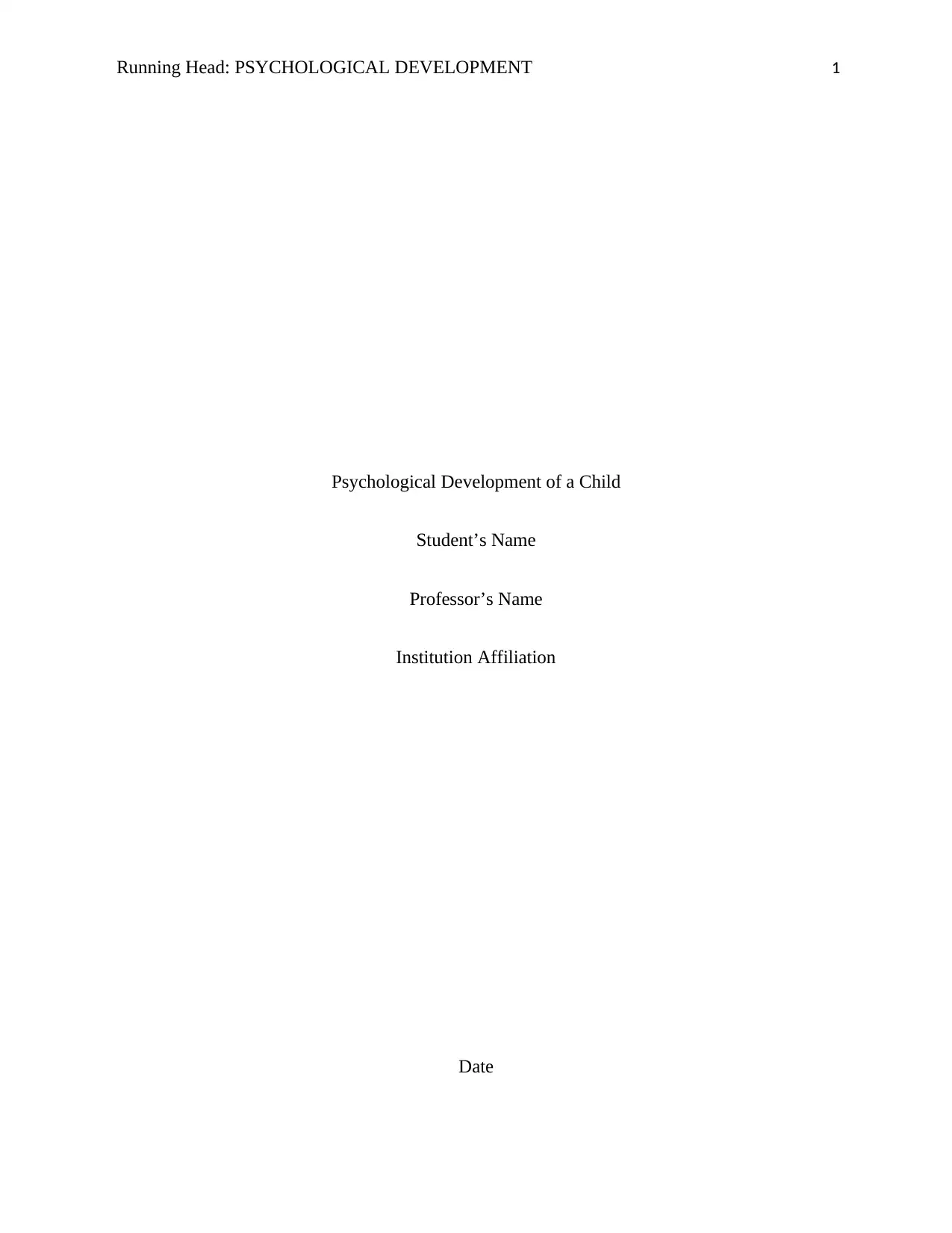
Running Head: PSYCHOLOGICAL DEVELOPMENT 1
Psychological Development of a Child
Student’s Name
Professor’s Name
Institution Affiliation
Date
Psychological Development of a Child
Student’s Name
Professor’s Name
Institution Affiliation
Date
Paraphrase This Document
Need a fresh take? Get an instant paraphrase of this document with our AI Paraphraser
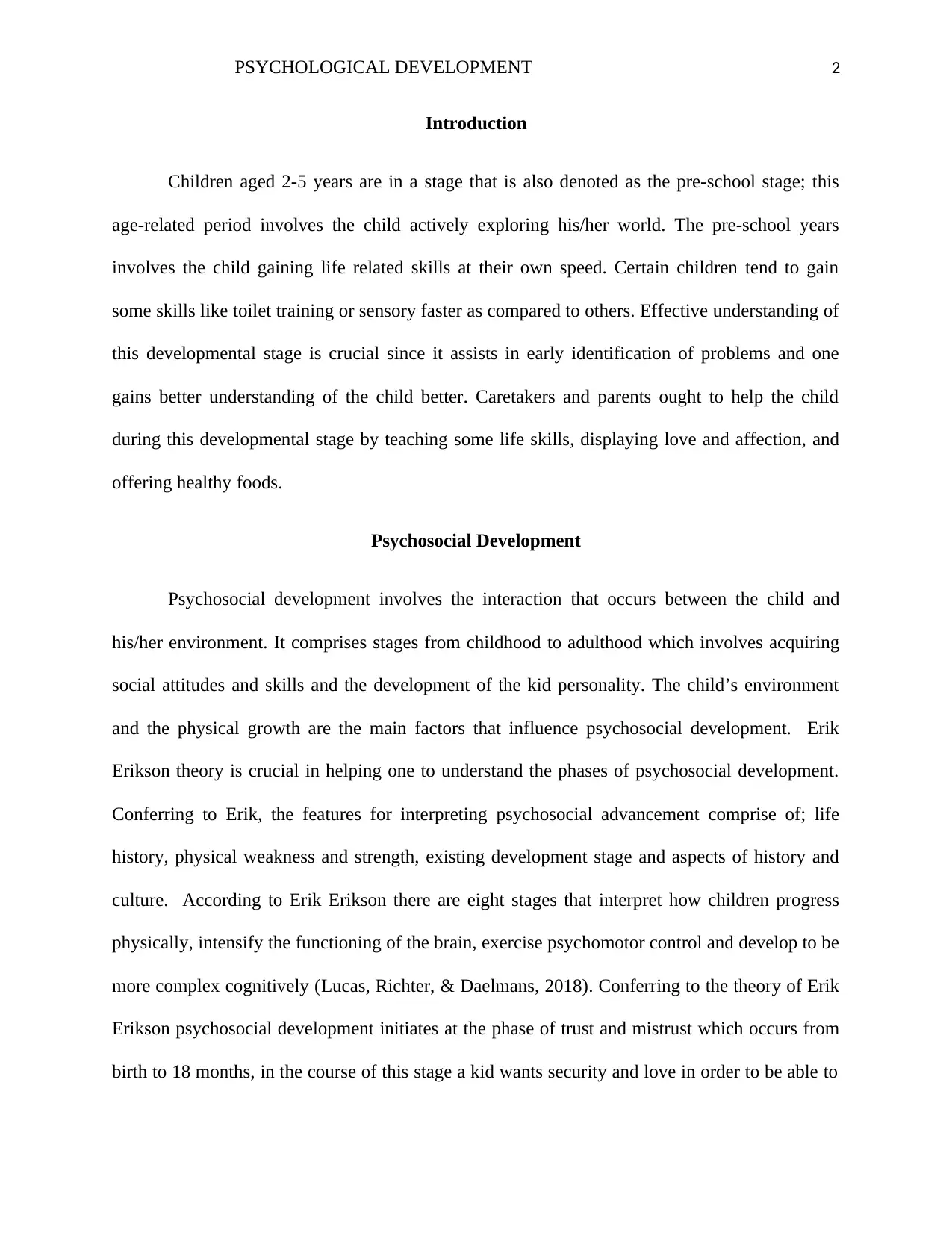
PSYCHOLOGICAL DEVELOPMENT 2
Introduction
Children aged 2-5 years are in a stage that is also denoted as the pre-school stage; this
age-related period involves the child actively exploring his/her world. The pre-school years
involves the child gaining life related skills at their own speed. Certain children tend to gain
some skills like toilet training or sensory faster as compared to others. Effective understanding of
this developmental stage is crucial since it assists in early identification of problems and one
gains better understanding of the child better. Caretakers and parents ought to help the child
during this developmental stage by teaching some life skills, displaying love and affection, and
offering healthy foods.
Psychosocial Development
Psychosocial development involves the interaction that occurs between the child and
his/her environment. It comprises stages from childhood to adulthood which involves acquiring
social attitudes and skills and the development of the kid personality. The child’s environment
and the physical growth are the main factors that influence psychosocial development. Erik
Erikson theory is crucial in helping one to understand the phases of psychosocial development.
Conferring to Erik, the features for interpreting psychosocial advancement comprise of; life
history, physical weakness and strength, existing development stage and aspects of history and
culture. According to Erik Erikson there are eight stages that interpret how children progress
physically, intensify the functioning of the brain, exercise psychomotor control and develop to be
more complex cognitively (Lucas, Richter, & Daelmans, 2018). Conferring to the theory of Erik
Erikson psychosocial development initiates at the phase of trust and mistrust which occurs from
birth to 18 months, in the course of this stage a kid wants security and love in order to be able to
Introduction
Children aged 2-5 years are in a stage that is also denoted as the pre-school stage; this
age-related period involves the child actively exploring his/her world. The pre-school years
involves the child gaining life related skills at their own speed. Certain children tend to gain
some skills like toilet training or sensory faster as compared to others. Effective understanding of
this developmental stage is crucial since it assists in early identification of problems and one
gains better understanding of the child better. Caretakers and parents ought to help the child
during this developmental stage by teaching some life skills, displaying love and affection, and
offering healthy foods.
Psychosocial Development
Psychosocial development involves the interaction that occurs between the child and
his/her environment. It comprises stages from childhood to adulthood which involves acquiring
social attitudes and skills and the development of the kid personality. The child’s environment
and the physical growth are the main factors that influence psychosocial development. Erik
Erikson theory is crucial in helping one to understand the phases of psychosocial development.
Conferring to Erik, the features for interpreting psychosocial advancement comprise of; life
history, physical weakness and strength, existing development stage and aspects of history and
culture. According to Erik Erikson there are eight stages that interpret how children progress
physically, intensify the functioning of the brain, exercise psychomotor control and develop to be
more complex cognitively (Lucas, Richter, & Daelmans, 2018). Conferring to the theory of Erik
Erikson psychosocial development initiates at the phase of trust and mistrust which occurs from
birth to 18 months, in the course of this stage a kid wants security and love in order to be able to
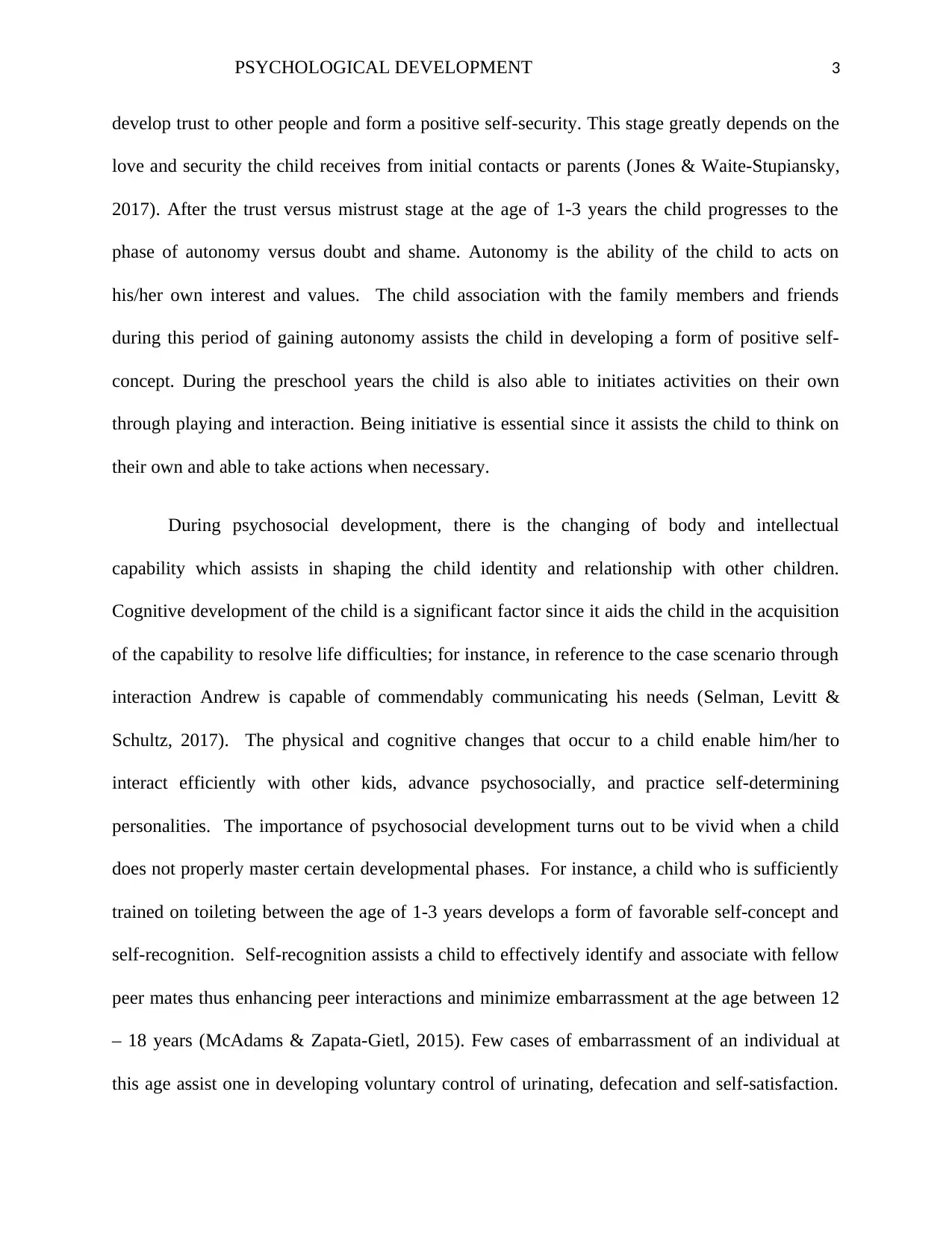
PSYCHOLOGICAL DEVELOPMENT 3
develop trust to other people and form a positive self-security. This stage greatly depends on the
love and security the child receives from initial contacts or parents (Jones & Waite-Stupiansky,
2017). After the trust versus mistrust stage at the age of 1-3 years the child progresses to the
phase of autonomy versus doubt and shame. Autonomy is the ability of the child to acts on
his/her own interest and values. The child association with the family members and friends
during this period of gaining autonomy assists the child in developing a form of positive self-
concept. During the preschool years the child is also able to initiates activities on their own
through playing and interaction. Being initiative is essential since it assists the child to think on
their own and able to take actions when necessary.
During psychosocial development, there is the changing of body and intellectual
capability which assists in shaping the child identity and relationship with other children.
Cognitive development of the child is a significant factor since it aids the child in the acquisition
of the capability to resolve life difficulties; for instance, in reference to the case scenario through
interaction Andrew is capable of commendably communicating his needs (Selman, Levitt &
Schultz, 2017). The physical and cognitive changes that occur to a child enable him/her to
interact efficiently with other kids, advance psychosocially, and practice self-determining
personalities. The importance of psychosocial development turns out to be vivid when a child
does not properly master certain developmental phases. For instance, a child who is sufficiently
trained on toileting between the age of 1-3 years develops a form of favorable self-concept and
self-recognition. Self-recognition assists a child to effectively identify and associate with fellow
peer mates thus enhancing peer interactions and minimize embarrassment at the age between 12
– 18 years (McAdams & Zapata-Gietl, 2015). Few cases of embarrassment of an individual at
this age assist one in developing voluntary control of urinating, defecation and self-satisfaction.
develop trust to other people and form a positive self-security. This stage greatly depends on the
love and security the child receives from initial contacts or parents (Jones & Waite-Stupiansky,
2017). After the trust versus mistrust stage at the age of 1-3 years the child progresses to the
phase of autonomy versus doubt and shame. Autonomy is the ability of the child to acts on
his/her own interest and values. The child association with the family members and friends
during this period of gaining autonomy assists the child in developing a form of positive self-
concept. During the preschool years the child is also able to initiates activities on their own
through playing and interaction. Being initiative is essential since it assists the child to think on
their own and able to take actions when necessary.
During psychosocial development, there is the changing of body and intellectual
capability which assists in shaping the child identity and relationship with other children.
Cognitive development of the child is a significant factor since it aids the child in the acquisition
of the capability to resolve life difficulties; for instance, in reference to the case scenario through
interaction Andrew is capable of commendably communicating his needs (Selman, Levitt &
Schultz, 2017). The physical and cognitive changes that occur to a child enable him/her to
interact efficiently with other kids, advance psychosocially, and practice self-determining
personalities. The importance of psychosocial development turns out to be vivid when a child
does not properly master certain developmental phases. For instance, a child who is sufficiently
trained on toileting between the age of 1-3 years develops a form of favorable self-concept and
self-recognition. Self-recognition assists a child to effectively identify and associate with fellow
peer mates thus enhancing peer interactions and minimize embarrassment at the age between 12
– 18 years (McAdams & Zapata-Gietl, 2015). Few cases of embarrassment of an individual at
this age assist one in developing voluntary control of urinating, defecation and self-satisfaction.
⊘ This is a preview!⊘
Do you want full access?
Subscribe today to unlock all pages.

Trusted by 1+ million students worldwide
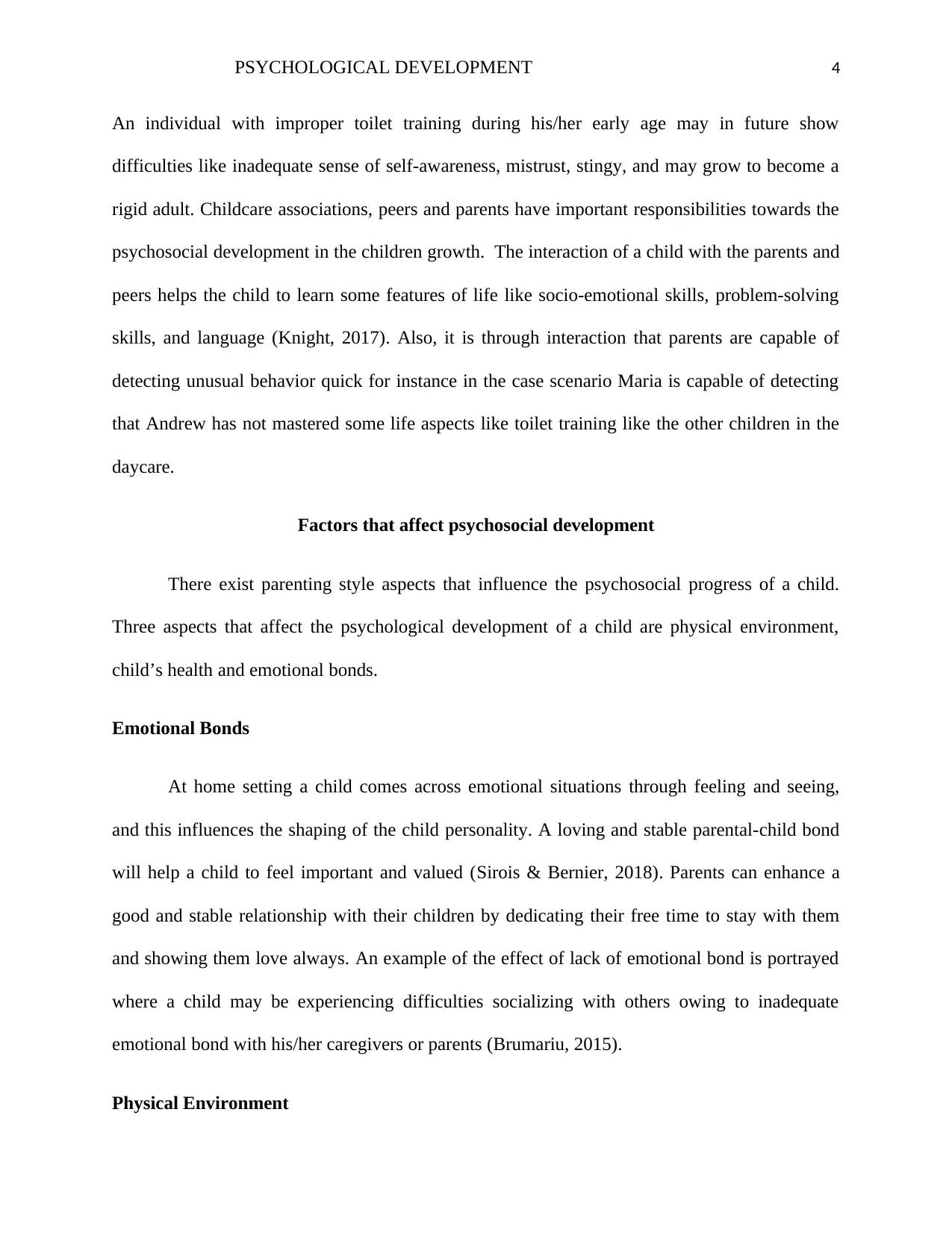
PSYCHOLOGICAL DEVELOPMENT 4
An individual with improper toilet training during his/her early age may in future show
difficulties like inadequate sense of self-awareness, mistrust, stingy, and may grow to become a
rigid adult. Childcare associations, peers and parents have important responsibilities towards the
psychosocial development in the children growth. The interaction of a child with the parents and
peers helps the child to learn some features of life like socio-emotional skills, problem-solving
skills, and language (Knight, 2017). Also, it is through interaction that parents are capable of
detecting unusual behavior quick for instance in the case scenario Maria is capable of detecting
that Andrew has not mastered some life aspects like toilet training like the other children in the
daycare.
Factors that affect psychosocial development
There exist parenting style aspects that influence the psychosocial progress of a child.
Three aspects that affect the psychological development of a child are physical environment,
child’s health and emotional bonds.
Emotional Bonds
At home setting a child comes across emotional situations through feeling and seeing,
and this influences the shaping of the child personality. A loving and stable parental-child bond
will help a child to feel important and valued (Sirois & Bernier, 2018). Parents can enhance a
good and stable relationship with their children by dedicating their free time to stay with them
and showing them love always. An example of the effect of lack of emotional bond is portrayed
where a child may be experiencing difficulties socializing with others owing to inadequate
emotional bond with his/her caregivers or parents (Brumariu, 2015).
Physical Environment
An individual with improper toilet training during his/her early age may in future show
difficulties like inadequate sense of self-awareness, mistrust, stingy, and may grow to become a
rigid adult. Childcare associations, peers and parents have important responsibilities towards the
psychosocial development in the children growth. The interaction of a child with the parents and
peers helps the child to learn some features of life like socio-emotional skills, problem-solving
skills, and language (Knight, 2017). Also, it is through interaction that parents are capable of
detecting unusual behavior quick for instance in the case scenario Maria is capable of detecting
that Andrew has not mastered some life aspects like toilet training like the other children in the
daycare.
Factors that affect psychosocial development
There exist parenting style aspects that influence the psychosocial progress of a child.
Three aspects that affect the psychological development of a child are physical environment,
child’s health and emotional bonds.
Emotional Bonds
At home setting a child comes across emotional situations through feeling and seeing,
and this influences the shaping of the child personality. A loving and stable parental-child bond
will help a child to feel important and valued (Sirois & Bernier, 2018). Parents can enhance a
good and stable relationship with their children by dedicating their free time to stay with them
and showing them love always. An example of the effect of lack of emotional bond is portrayed
where a child may be experiencing difficulties socializing with others owing to inadequate
emotional bond with his/her caregivers or parents (Brumariu, 2015).
Physical Environment
Paraphrase This Document
Need a fresh take? Get an instant paraphrase of this document with our AI Paraphraser
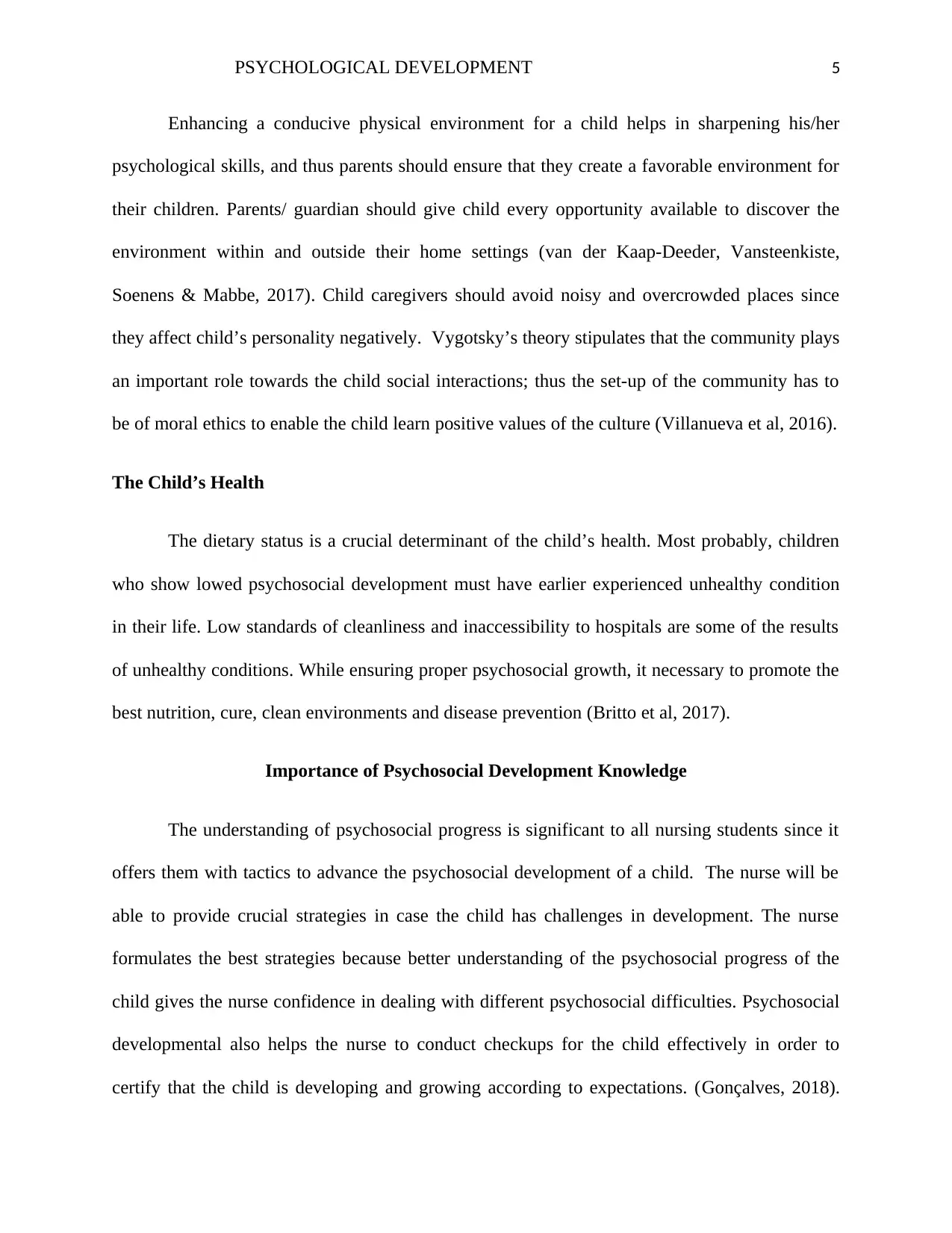
PSYCHOLOGICAL DEVELOPMENT 5
Enhancing a conducive physical environment for a child helps in sharpening his/her
psychological skills, and thus parents should ensure that they create a favorable environment for
their children. Parents/ guardian should give child every opportunity available to discover the
environment within and outside their home settings (van der Kaap-Deeder, Vansteenkiste,
Soenens & Mabbe, 2017). Child caregivers should avoid noisy and overcrowded places since
they affect child’s personality negatively. Vygotsky’s theory stipulates that the community plays
an important role towards the child social interactions; thus the set-up of the community has to
be of moral ethics to enable the child learn positive values of the culture (Villanueva et al, 2016).
The Child’s Health
The dietary status is a crucial determinant of the child’s health. Most probably, children
who show lowed psychosocial development must have earlier experienced unhealthy condition
in their life. Low standards of cleanliness and inaccessibility to hospitals are some of the results
of unhealthy conditions. While ensuring proper psychosocial growth, it necessary to promote the
best nutrition, cure, clean environments and disease prevention (Britto et al, 2017).
Importance of Psychosocial Development Knowledge
The understanding of psychosocial progress is significant to all nursing students since it
offers them with tactics to advance the psychosocial development of a child. The nurse will be
able to provide crucial strategies in case the child has challenges in development. The nurse
formulates the best strategies because better understanding of the psychosocial progress of the
child gives the nurse confidence in dealing with different psychosocial difficulties. Psychosocial
developmental also helps the nurse to conduct checkups for the child effectively in order to
certify that the child is developing and growing according to expectations. (Gonçalves, 2018).
Enhancing a conducive physical environment for a child helps in sharpening his/her
psychological skills, and thus parents should ensure that they create a favorable environment for
their children. Parents/ guardian should give child every opportunity available to discover the
environment within and outside their home settings (van der Kaap-Deeder, Vansteenkiste,
Soenens & Mabbe, 2017). Child caregivers should avoid noisy and overcrowded places since
they affect child’s personality negatively. Vygotsky’s theory stipulates that the community plays
an important role towards the child social interactions; thus the set-up of the community has to
be of moral ethics to enable the child learn positive values of the culture (Villanueva et al, 2016).
The Child’s Health
The dietary status is a crucial determinant of the child’s health. Most probably, children
who show lowed psychosocial development must have earlier experienced unhealthy condition
in their life. Low standards of cleanliness and inaccessibility to hospitals are some of the results
of unhealthy conditions. While ensuring proper psychosocial growth, it necessary to promote the
best nutrition, cure, clean environments and disease prevention (Britto et al, 2017).
Importance of Psychosocial Development Knowledge
The understanding of psychosocial progress is significant to all nursing students since it
offers them with tactics to advance the psychosocial development of a child. The nurse will be
able to provide crucial strategies in case the child has challenges in development. The nurse
formulates the best strategies because better understanding of the psychosocial progress of the
child gives the nurse confidence in dealing with different psychosocial difficulties. Psychosocial
developmental also helps the nurse to conduct checkups for the child effectively in order to
certify that the child is developing and growing according to expectations. (Gonçalves, 2018).
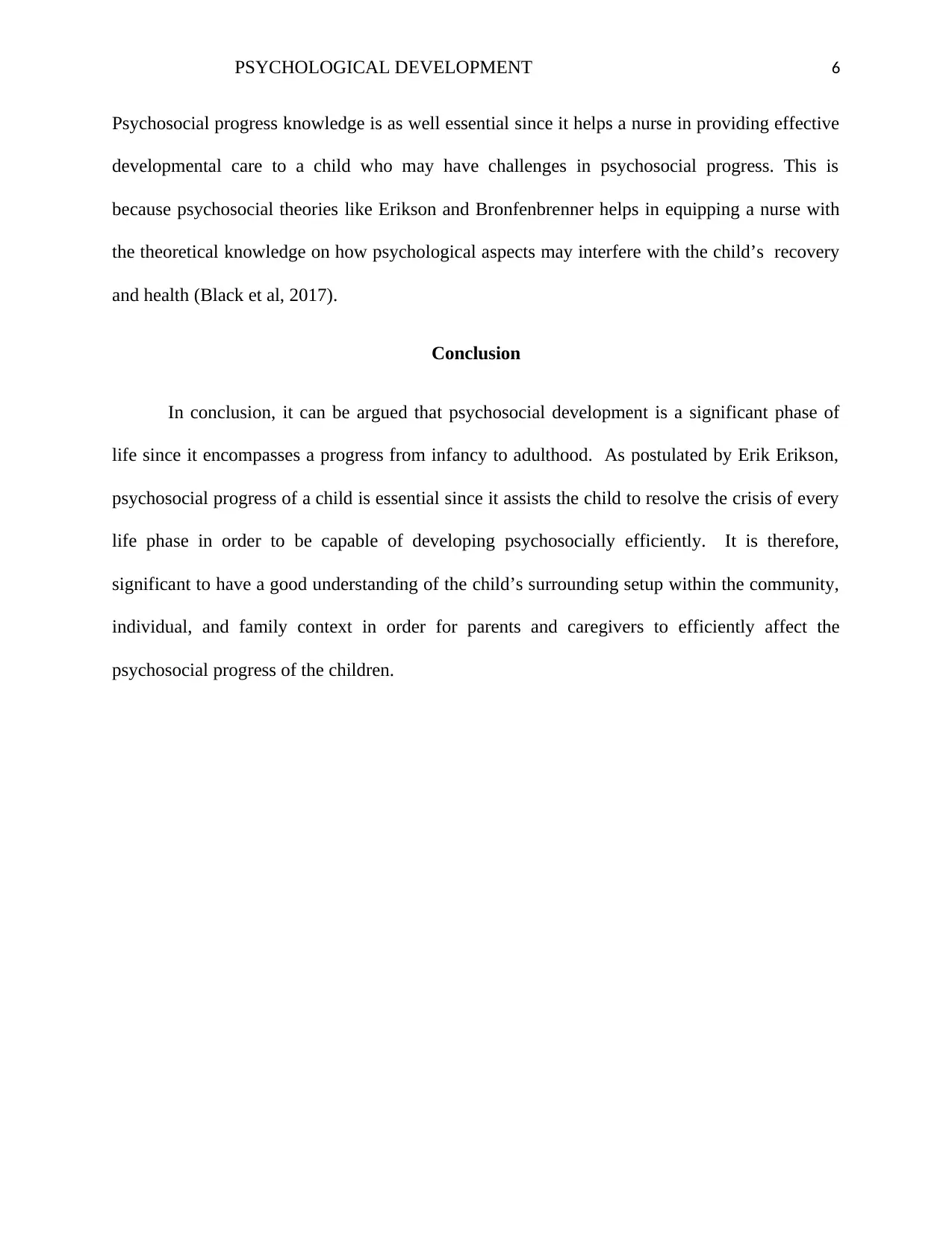
PSYCHOLOGICAL DEVELOPMENT 6
Psychosocial progress knowledge is as well essential since it helps a nurse in providing effective
developmental care to a child who may have challenges in psychosocial progress. This is
because psychosocial theories like Erikson and Bronfenbrenner helps in equipping a nurse with
the theoretical knowledge on how psychological aspects may interfere with the child’s recovery
and health (Black et al, 2017).
Conclusion
In conclusion, it can be argued that psychosocial development is a significant phase of
life since it encompasses a progress from infancy to adulthood. As postulated by Erik Erikson,
psychosocial progress of a child is essential since it assists the child to resolve the crisis of every
life phase in order to be capable of developing psychosocially efficiently. It is therefore,
significant to have a good understanding of the child’s surrounding setup within the community,
individual, and family context in order for parents and caregivers to efficiently affect the
psychosocial progress of the children.
Psychosocial progress knowledge is as well essential since it helps a nurse in providing effective
developmental care to a child who may have challenges in psychosocial progress. This is
because psychosocial theories like Erikson and Bronfenbrenner helps in equipping a nurse with
the theoretical knowledge on how psychological aspects may interfere with the child’s recovery
and health (Black et al, 2017).
Conclusion
In conclusion, it can be argued that psychosocial development is a significant phase of
life since it encompasses a progress from infancy to adulthood. As postulated by Erik Erikson,
psychosocial progress of a child is essential since it assists the child to resolve the crisis of every
life phase in order to be capable of developing psychosocially efficiently. It is therefore,
significant to have a good understanding of the child’s surrounding setup within the community,
individual, and family context in order for parents and caregivers to efficiently affect the
psychosocial progress of the children.
⊘ This is a preview!⊘
Do you want full access?
Subscribe today to unlock all pages.

Trusted by 1+ million students worldwide
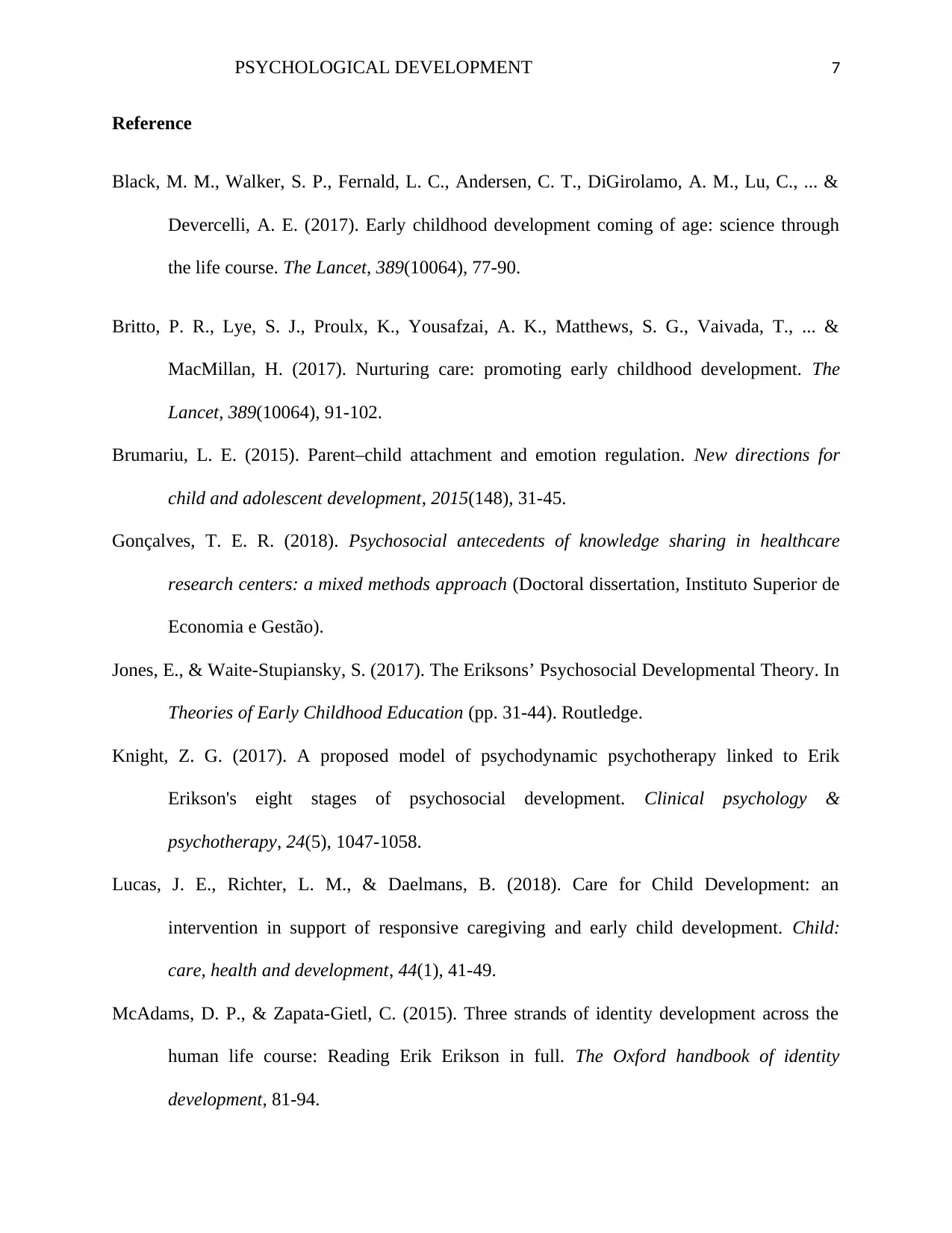
PSYCHOLOGICAL DEVELOPMENT 7
Reference
Black, M. M., Walker, S. P., Fernald, L. C., Andersen, C. T., DiGirolamo, A. M., Lu, C., ... &
Devercelli, A. E. (2017). Early childhood development coming of age: science through
the life course. The Lancet, 389(10064), 77-90.
Britto, P. R., Lye, S. J., Proulx, K., Yousafzai, A. K., Matthews, S. G., Vaivada, T., ... &
MacMillan, H. (2017). Nurturing care: promoting early childhood development. The
Lancet, 389(10064), 91-102.
Brumariu, L. E. (2015). Parent–child attachment and emotion regulation. New directions for
child and adolescent development, 2015(148), 31-45.
Gonçalves, T. E. R. (2018). Psychosocial antecedents of knowledge sharing in healthcare
research centers: a mixed methods approach (Doctoral dissertation, Instituto Superior de
Economia e Gestão).
Jones, E., & Waite-Stupiansky, S. (2017). The Eriksons’ Psychosocial Developmental Theory. In
Theories of Early Childhood Education (pp. 31-44). Routledge.
Knight, Z. G. (2017). A proposed model of psychodynamic psychotherapy linked to Erik
Erikson's eight stages of psychosocial development. Clinical psychology &
psychotherapy, 24(5), 1047-1058.
Lucas, J. E., Richter, L. M., & Daelmans, B. (2018). Care for Child Development: an
intervention in support of responsive caregiving and early child development. Child:
care, health and development, 44(1), 41-49.
McAdams, D. P., & Zapata-Gietl, C. (2015). Three strands of identity development across the
human life course: Reading Erik Erikson in full. The Oxford handbook of identity
development, 81-94.
Reference
Black, M. M., Walker, S. P., Fernald, L. C., Andersen, C. T., DiGirolamo, A. M., Lu, C., ... &
Devercelli, A. E. (2017). Early childhood development coming of age: science through
the life course. The Lancet, 389(10064), 77-90.
Britto, P. R., Lye, S. J., Proulx, K., Yousafzai, A. K., Matthews, S. G., Vaivada, T., ... &
MacMillan, H. (2017). Nurturing care: promoting early childhood development. The
Lancet, 389(10064), 91-102.
Brumariu, L. E. (2015). Parent–child attachment and emotion regulation. New directions for
child and adolescent development, 2015(148), 31-45.
Gonçalves, T. E. R. (2018). Psychosocial antecedents of knowledge sharing in healthcare
research centers: a mixed methods approach (Doctoral dissertation, Instituto Superior de
Economia e Gestão).
Jones, E., & Waite-Stupiansky, S. (2017). The Eriksons’ Psychosocial Developmental Theory. In
Theories of Early Childhood Education (pp. 31-44). Routledge.
Knight, Z. G. (2017). A proposed model of psychodynamic psychotherapy linked to Erik
Erikson's eight stages of psychosocial development. Clinical psychology &
psychotherapy, 24(5), 1047-1058.
Lucas, J. E., Richter, L. M., & Daelmans, B. (2018). Care for Child Development: an
intervention in support of responsive caregiving and early child development. Child:
care, health and development, 44(1), 41-49.
McAdams, D. P., & Zapata-Gietl, C. (2015). Three strands of identity development across the
human life course: Reading Erik Erikson in full. The Oxford handbook of identity
development, 81-94.
Paraphrase This Document
Need a fresh take? Get an instant paraphrase of this document with our AI Paraphraser
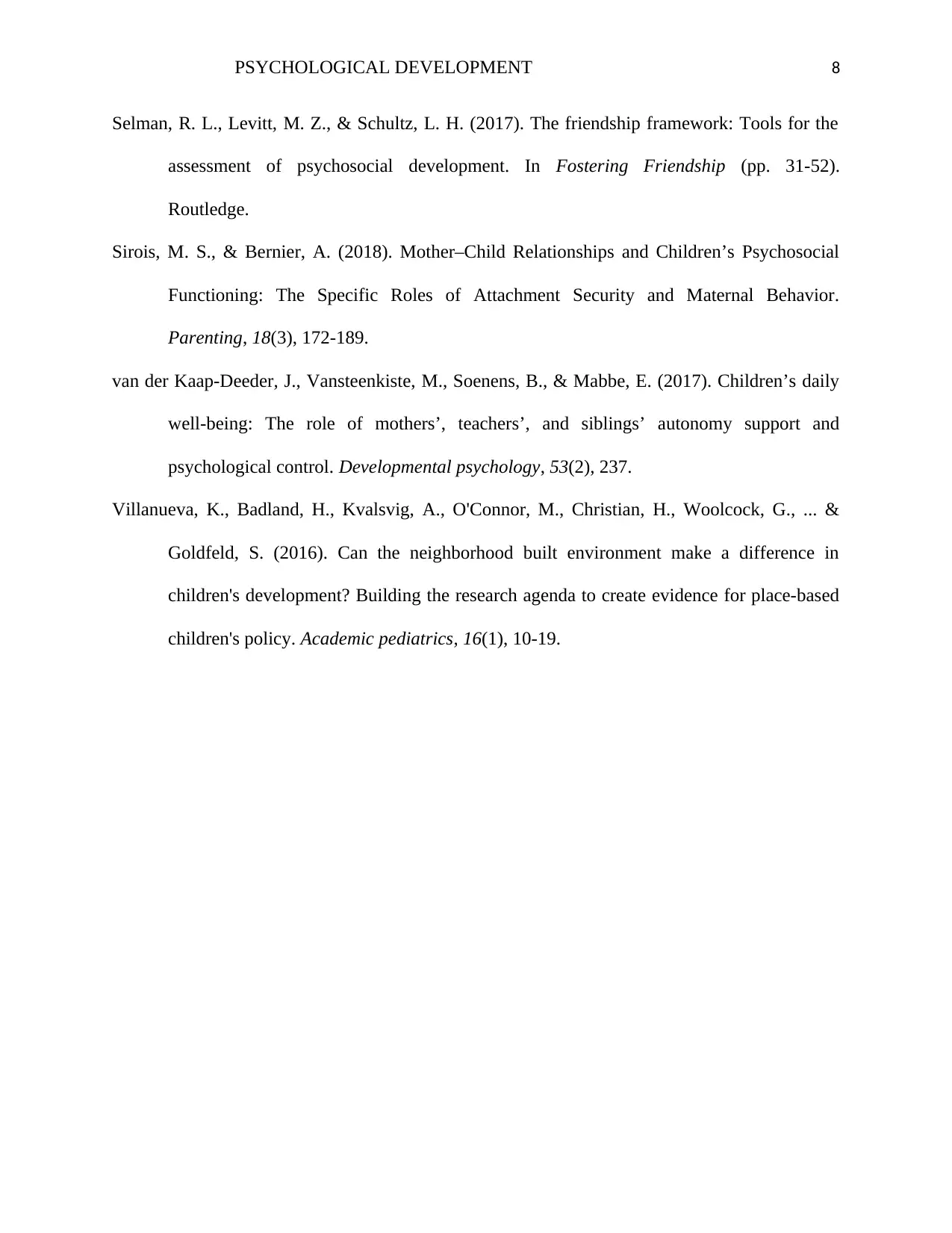
PSYCHOLOGICAL DEVELOPMENT 8
Selman, R. L., Levitt, M. Z., & Schultz, L. H. (2017). The friendship framework: Tools for the
assessment of psychosocial development. In Fostering Friendship (pp. 31-52).
Routledge.
Sirois, M. S., & Bernier, A. (2018). Mother–Child Relationships and Children’s Psychosocial
Functioning: The Specific Roles of Attachment Security and Maternal Behavior.
Parenting, 18(3), 172-189.
van der Kaap-Deeder, J., Vansteenkiste, M., Soenens, B., & Mabbe, E. (2017). Children’s daily
well-being: The role of mothers’, teachers’, and siblings’ autonomy support and
psychological control. Developmental psychology, 53(2), 237.
Villanueva, K., Badland, H., Kvalsvig, A., O'Connor, M., Christian, H., Woolcock, G., ... &
Goldfeld, S. (2016). Can the neighborhood built environment make a difference in
children's development? Building the research agenda to create evidence for place-based
children's policy. Academic pediatrics, 16(1), 10-19.
Selman, R. L., Levitt, M. Z., & Schultz, L. H. (2017). The friendship framework: Tools for the
assessment of psychosocial development. In Fostering Friendship (pp. 31-52).
Routledge.
Sirois, M. S., & Bernier, A. (2018). Mother–Child Relationships and Children’s Psychosocial
Functioning: The Specific Roles of Attachment Security and Maternal Behavior.
Parenting, 18(3), 172-189.
van der Kaap-Deeder, J., Vansteenkiste, M., Soenens, B., & Mabbe, E. (2017). Children’s daily
well-being: The role of mothers’, teachers’, and siblings’ autonomy support and
psychological control. Developmental psychology, 53(2), 237.
Villanueva, K., Badland, H., Kvalsvig, A., O'Connor, M., Christian, H., Woolcock, G., ... &
Goldfeld, S. (2016). Can the neighborhood built environment make a difference in
children's development? Building the research agenda to create evidence for place-based
children's policy. Academic pediatrics, 16(1), 10-19.
1 out of 8
Related Documents
Your All-in-One AI-Powered Toolkit for Academic Success.
+13062052269
info@desklib.com
Available 24*7 on WhatsApp / Email
![[object Object]](/_next/static/media/star-bottom.7253800d.svg)
Unlock your academic potential
Copyright © 2020–2026 A2Z Services. All Rights Reserved. Developed and managed by ZUCOL.





